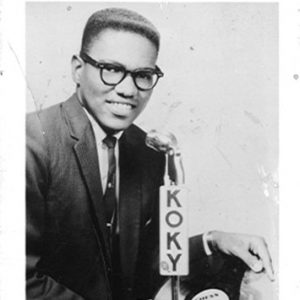calsfoundation@cals.org
Al Bell (1940–)
aka: Alvertis Isbell
Al Bell is considered the driving force behind Stax Records as a producer, songwriter, and executive during the company’s most productive period, from 1965 to 1975. He was responsible for promoting the careers of such talent as the Staple Singers, Isaac Hayes, and Otis Redding, among many others.
Al Bell was born Alvertis Isbell on March 15, 1940, in Brinkley (Monroe County). One of his earliest musical memories was that of listening to his father’s Louis Jordan records. In an interview published in 2001, Bell claimed Jordan, also a Brinkley native, as a distant relative. Bell’s family moved to North Little Rock (Pulaski County) when he was five years old. After attending Catholic and Seventh-Day Adventist private schools, Bell attended Scipio A. Jones High School in North Little Rock, the public high school for African-American students during the period of segregation. During his junior and senior years there, he presided over the state honor society, the student council, and the audio visual society. The latter post put him in charge of the record player during school dances. Borrowing records from his fellow students to play at these “sock-hops,” Bell began to develop an ear for popular music. He organized a talent contest between Scipio A. Jones High School in North Little Rock and Dunbar High School in Little Rock (Pulaski County) held at the Dunbar Community Center, an event he named “Radio Station T-O-U-G-H, Tough.” The general manager of KOKY, a judge in the competition, asked Bell to come by the station the following week. Bell did so and hosted a gospel music program the following Sunday morning, as well as filling in for another disc jockey on a jazz program that evening. He shortened his name from Alvertis Isbell to Al Bell while working as a disc jockey.
Shortly after graduating from Scipio A. Jones High School, Bell attended Philander Smith College in Little Rock. While there, he was encouraged to go to Georgia to join Martin Luther King Jr. and the Southern Christian Leadership Council, where he would eventually become a student/teacher. Bell and King did not see eye to eye on how to respond to attacks on protestors. A particular incident in which Bell was spat upon and responded by lunging with a knife at his assailant made their philosophical disagreement untenable. Bell left the organization and reenrolled at Philander Smith.
Bell then had an opportunity to be a disc jockey at WLOK in Memphis, Tennessee. Bell started his own label, Devore, and used the studio facilities at Stax Records. Stax had had some moderate success outside of the Mississippi Delta region with Booker T. & the M.G.s and their hit “Green Onions” in the early 1960s.
Bell married Linda Mae Purifoy on December 25, 1963, and they had two sons.
Bell took another disc jockey job in the Washington DC area but remained in touch with Stax owner Jim Stewart. Bell gained notoriety for being one of the only disc jockeys playing Stax music in the Washington DC area. Stewart began seeking Bell’s advice as he was creating a new market in the region for Stax music. In the fall of 1965, Bell officially joined Stax as head of promotion; problems with a distribution agreement with Atlantic Records had inspired the move by Stewart. However, Bell had again started a record label, this time called Safice, while working on the East Coast, and he also had a distribution agreement through Atlantic. Jerry Wexler at Atlantic told him that they were contributing money to pay Bell to improve the demand for Stax music, but the amount was a severe cut in pay for the multi-tasking Bell, who had a variety of income sources stemming from his connections in the music industry in Washington DC (for example, he had been involved in producing and engineering Grover Mitchell’s “Midnight Tears,” which was released on the Decca label). The eventual agreement was for Bell to try and turn the struggling record company around, and, if he succeeded, he would be given part ownership in Stax.
Moving from the business side to production, Bell engineered Isaac Hayes’s debut album, Presenting Isaac Hayes (1967). However, Bell made his biggest contribution as a producer with the Staple Singers. He had been introduced to the group while working at KOKY in Little Rock, and Bell wrote their biggest hit, “I’ll Take You There,” while visiting North Little Rock for his brother Louis’s funeral.
Stax began to have financial troubles after losing the rights to its back catalogs—including the biggest hits from Sam & Dave and Otis Redding—to Atlantic, followed by the death of Redding in a December 1967 plane crash. The company regrouped by separating itself from Atlantic and creating multiple subsidiary labels to produce music for various genres, including country and jazz, in addition to the traditional Stax fare of soul, funk, and rhythm and blues. In July 1969, Stax reported sales of ten million singles within one year of its becoming independent, but a 1972 distribution deal with CBS turned bad for Stax and led to an unsuccessful $67 million antitrust lawsuit.
By 1974, Bell had acquired Stax from Jim Stewart, and it became the fifth-largest black-owned company in America, according to Black Enterprise Magazine, even as the company was facing total financial collapse. Bell was given an offer to sell from CBS but turned it down. He then attempted to move the label to Arkansas through talks with former governor Winthrop Rockefeller, who died before a deal could be concluded. Stax went bankrupt in December 1975, but Bell made another attempt to revive the label in 1978 through talks with Governor Bill Clinton. Clinton was interested in the economic benefits the label could bring to the state, but his first term as governor held unexpected challenges, and he was unable to win reelection, halting the plans for Stax’s rebirth.
Bell moved to California and set up a management firm that represented artists such as Mavis Staples and Prince. Bell used the time to re-establish contacts in the music industry. He met with Berry Gordy at Motown, who was having distribution problems similar to those Bell had experienced at Stax. Bell took over as head of Motown Records Group for a time and began advising Gordy to sell the company. Bell started Bellmark Records and Alvert Music, which produced some significant hits, including Tag Team’s “Whoomp! There It Is” (1993). He was involved in several of the first lawsuits over music “sampling” while in California.
By 2001, Bell was again living in North Little Rock. One of his sons was involved in the music business by that time and started Alpine Records with a studio in Bryant (Saline County).
Among his many honors, Bell was inducted into the Arkansas Black Hall of Fame in 2002, named the chairman of the Memphis Music Foundation in 2009, received a Grammy Trustees Award in 2011, and was inducted into the Memphis Music Hall of Fame in 2014. The Grammy Trustees award is given by the board of trustees of the Recording Academy and is considered a top music industry award. In October 2018, Bell was named the McIlroy Family Visiting Professor in the Visual and Performing Arts at the University of Arkansas (UA) in Fayetteville (Washington County).
In 2019, Bell announced that he was moving his home and business to Bentonville (Benton County).
For additional information:
Bell, Al. “Interview with Al Bell.” October 1, 2008. Audio online, Butler Center for Arkansas Studies: Al Bell Interview (accessed June 26, 2025).
Gordon, Robert. Respect Yourself: Stax Records and the Soul Explosion. New York: Bloomsbury, 2013.
Hill, Jack W. “Alvertis Isbell.” Arkansas Democrat-Gazette, November 16, 2008, pp. 1D, 6D.
Jordan, Mary. “Ex-Stax, Motown Exec Heading to Bright Light of Bentonville.” Arkansas Democrat-Gazette, August 4, 2019, pp. 1B, 5B.
Koch, S. “From Brinkley to Bryant.” Arkansas Times, June 7, 2002, pp. 10–13.
Koch, Stephen. “Al Bell Takes Us There: An Interview by Stephen Koch.” Arkansas Review: A Journal of Delta Studies 32 (April 2001): 49–59.
———. “Stax Up.” Arkansas Democrat-Gazette, August 12, 2001, pp. 1E–2E.
“Trustees Award: Al Bell.” http://www.grammy.com/news/trustees-award-al-bell (accessed June 26, 2025).
Michael Hodge
North Little Rock, Arkansas









Comments
No comments on this entry yet.